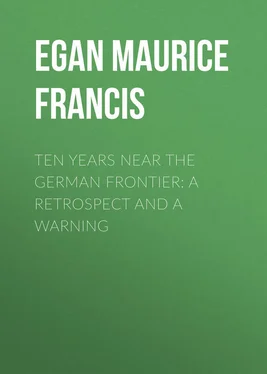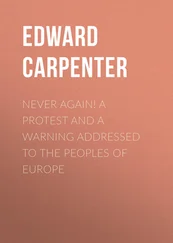Maurice Egan - Ten Years Near the German Frontier - A Retrospect and a Warning
Здесь есть возможность читать онлайн «Maurice Egan - Ten Years Near the German Frontier - A Retrospect and a Warning» — ознакомительный отрывок электронной книги совершенно бесплатно, а после прочтения отрывка купить полную версию. В некоторых случаях можно слушать аудио, скачать через торрент в формате fb2 и присутствует краткое содержание. Жанр: foreign_antique, foreign_prose, на английском языке. Описание произведения, (предисловие) а так же отзывы посетителей доступны на портале библиотеки ЛибКат.
- Название:Ten Years Near the German Frontier: A Retrospect and a Warning
- Автор:
- Жанр:
- Год:неизвестен
- ISBN:нет данных
- Рейтинг книги:5 / 5. Голосов: 1
-
Избранное:Добавить в избранное
- Отзывы:
-
Ваша оценка:
- 100
- 1
- 2
- 3
- 4
- 5
Ten Years Near the German Frontier: A Retrospect and a Warning: краткое содержание, описание и аннотация
Предлагаем к чтению аннотацию, описание, краткое содержание или предисловие (зависит от того, что написал сам автор книги «Ten Years Near the German Frontier: A Retrospect and a Warning»). Если вы не нашли необходимую информацию о книге — напишите в комментариях, мы постараемся отыскать её.
Ten Years Near the German Frontier: A Retrospect and a Warning — читать онлайн ознакомительный отрывок
Ниже представлен текст книги, разбитый по страницам. Система сохранения места последней прочитанной страницы, позволяет с удобством читать онлайн бесплатно книгу «Ten Years Near the German Frontier: A Retrospect and a Warning», без необходимости каждый раз заново искать на чём Вы остановились. Поставьте закладку, и сможете в любой момент перейти на страницу, на которой закончили чтение.
Интервал:
Закладка:
There was something else that added to his indignation. One day, very silently, he opened the doors that concealed a panel in the wall. There was a very Lutheran picture indeed! It was done in glaring colours, even realistic colours. It represented various devils, horned and tailed and pitch-forked, poking into the fire in the lower regions a pope and several cardinals, who were turning to crimson like lobsters, while some pious Lutheran prelates gave great thanks for this agreeable proceeding. 'In my own chapel,' said Count Holstein, 'almost facing the altar; and the law will not permit me to remove it!'
Being an American, I smiled; thereby, I almost lost a really valued friendship.
'I shall arrange with the king to give a substitute for the chapel to the commune – a school-house or a library – and have the chapel consecrated,' he said. 'I think I see my way.'
'"All things come to him who knows how to wait,"' I quoted.
In 1909, at the time of the crisis, he accepted the task of forming a cabinet to get the defence bill through Parliament, but he made one condition with the king – that he should have his own chapel to do as he liked with. He carried the defence bill through triumphantly and then, having made his point, and finding Parliament unreasonable, from his point of view, on some question or other, he told its members to go where Orpheus sought Eurydice, and retired! He died too soon; he would have been a great help to us in the troubled days when we were trying to buy the Virgin Islands. He was my mentor in European politics, and a most distinguished man; and what is better, a good friend. At times he was sardonic. 'I would make,' he said, 'if I had the power, Edward Brandès (Brandès is of the famous Brandès family) minister of Public Worship!' (As Brandès is a Jew and a Greek pagan both at once, it would have been one of those ironies of statecraft like that which made the Duke of Norfolk patron of some Anglican livings.) Count Holstein disliked state churches. He was a strange mixture of the wit of Voltaire with the faith of Pascal, and one of the most inflexible of Radicals.
The party for the defence and for the integrity of the army and navy had its way; but, owing to the attitude of the Socialists, a very moderate way. 'If Germany comes, she will take us,' the Radicals said with the Socialists; 'why waste public money on soldiers and military bands and submarines?'
But there are enough stalwarts, including the king, Christian, to believe that a country worth living in is worth fighting for!
CHAPTER II
THE MENACE OF 'OUR NEIGHBOUR TO THE SOUTH'
In 1907, Russia seemed to me to be, for Americans, the most important country in Europe. Our Department of State was no doubt informed as to what the other countries would do in certain contingencies, for none of our diplomatic representatives, although always working under disadvantages not experienced by their European colleagues, had been idle persons. But all of us who had even cursorily studied European conditions knew that the actions of Germany would depend largely on the attitude of Russia. It was to the interest of Emperor William to keep Nicholas II. and the Romanoffs on the throne. He saw no other way of dividing and conquering a country which he at once hated and longed to control.
The Balkan situation was always burning; it was the Etna and Vesuvius of the diplomatic world; wise men might predict eruptions, but they were always unexpected. To most people in the United States the Balkans seemed very far off; Bulgaria with her eyes on Macedonia, the Tsar Ferdinand and his attempt to put his son, Boris, under the greater Tsar, him of Russia; Rumania and her ambitions for more freedom and more territory; Serbia, with her fears and aspirations, appeared to be of no importance – of less interest, perhaps, than other petty kingdoms. But at one fatal moment Austria refused to allow Serbia to export her pigs, and we came to pay about two million dollars an hour and to sacrifice most precious lives, much greater things, because of the ferocious growth of this little germ of tyranny and avarice.
Most of us have fixed ideas; if they are the result of prejudice, they are generally bad; if they are the result of principle, that is another question. When I went to Denmark at the request of President Roosevelt, I had several fixed ideas, whether of prejudice or principle I could not always distinguish. I had been brought up in a sentiment of gratitude to Russia – she had behaved well to us in the Civil War – and in a firm belief that her people only needed a fair chance to become our firm friends. We must seek European markets for our capital and our investments, and Russia offered us a free way.
Towards the end of the year 1908, the signs in Russia were more ominous than usual. It had always seemed to me – and the impression had come probably from long and intimate association with some very clever diplomatists – that Russian problems, industrially and economically, were very similar to our own, and that, in the future, her interests would be our interests. She was in evil hands – that was evident; Nicholas II., after the peace of Portsmouth, was not so pleased with the action of President Roosevelt as he ought to have been, and the arrogant clique, the bureaucrats who controlled the Tsar, regarded us with suspicion and dislike.
At the same time, it was plain that a great part of the landed nobility looked with hope to the United States as a nation which ought to understand their problems and assist, with technical advice and capital, in the solving of them. The Baltic Barons, many with German names and not of the orthodox faith, preferred that the United States, by the investments of her citizens in Russia, should hold a balance between the French and the German financial influences, for Germany was slowly beginning to control Russia financially, and French capital meant a competition with the German interests which might eventually mean a conflict and war. The well instructed among the Russian people, including the estate owners whose interests were not bureaucratic, feared war above all things. The Japanese war had given them reason for their fears.
To my mind there were three questions of great importance for us: How could we, with self-respect, keep on good terms with Russia? How could we discover what Germany's intentions were? And how could we strengthen the force of the Monroe Doctrine by acquiring, through legitimate means, certain islands on our coasts, especially the Gallapagos, the Danish West Indies and others which, perhaps, it might not be discreet to mention.
While the United States seemed fixed in her policy of keeping out of foreign entanglements, it seemed to me that the rule of conduct of a nation, like that of an individual, cannot always be consistent with its theories, since all intentions put into action by the party of the first part must depend on the action and point of view of the party of the second part. I had been largely influenced in my views of the value of the Monroe Doctrine by the speeches and writings of ex-President Roosevelt and Senator Lodge. It was a self-evident truth, too, that, for the sake of democracy, for the sake of the future of our country, the autonomy of the small nations must be preserved. This attitude I made plain during my ten years in Denmark; perhaps I over-accentuated it, but to this attitude I owe the regard of the majority of the Danish people and of some of the folk of the other Scandinavian nations.
The position taken by Germany, under Prussian influence, in Brazil and Argentine, certain indications in our own country, which I shall emphasise later, the intrigues as to the Bagdad Railway, and the threats as to what Germany might do in Scandinavia in case Russia attempted to interfere with German plans in the East, were alarming. Then again was the hint that Denmark might be seized if Germany found Russia in an alliance against England.
Читать дальшеИнтервал:
Закладка:
Похожие книги на «Ten Years Near the German Frontier: A Retrospect and a Warning»
Представляем Вашему вниманию похожие книги на «Ten Years Near the German Frontier: A Retrospect and a Warning» списком для выбора. Мы отобрали схожую по названию и смыслу литературу в надежде предоставить читателям больше вариантов отыскать новые, интересные, ещё непрочитанные произведения.
Обсуждение, отзывы о книге «Ten Years Near the German Frontier: A Retrospect and a Warning» и просто собственные мнения читателей. Оставьте ваши комментарии, напишите, что Вы думаете о произведении, его смысле или главных героях. Укажите что конкретно понравилось, а что нет, и почему Вы так считаете.












